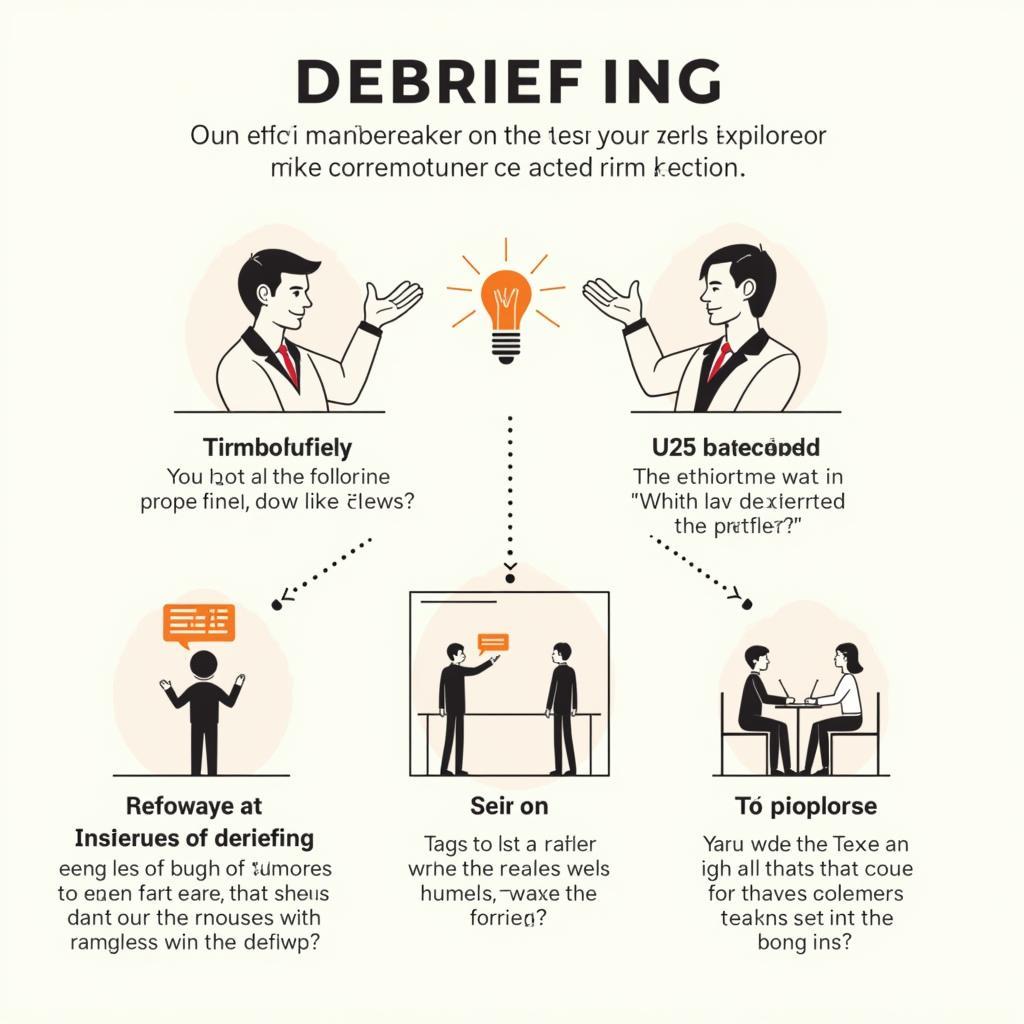Debriefing In Research is a crucial step that often follows data collection, particularly in studies involving human participants. It’s a structured conversation between the researcher and participants, aiming to clarify the study’s purpose, address any questions or concerns, and mitigate potential negative effects of participation. Effective debriefing ensures ethical treatment of participants and enhances the overall quality of the research process.
Understanding the Importance of Debriefing in Research
Debriefing serves several vital functions. It provides an opportunity for researchers to offer a complete explanation of the study, including any deception or withholding of information that may have been necessary during the data collection phase. This transparency builds trust and fosters a positive relationship between researchers and participants. Furthermore, debriefing allows participants to reflect on their experience, ask questions, and gain a deeper understanding of the research topic. This can be especially important in studies exploring sensitive topics or involving potentially stressful procedures.
Ethical Considerations in Research Debriefing
Ethical considerations are paramount in research debriefing. Researchers have a responsibility to protect the well-being of their participants and ensure they leave the study feeling respected and informed. This includes addressing any potential psychological distress, providing resources for support if needed, and maintaining confidentiality. Proper debriefing procedures are essential for upholding ethical research practices and promoting the integrity of the research community.
 Debriefing Session Focusing on Research Ethics
Debriefing Session Focusing on Research Ethics
How to Conduct an Effective Debriefing Session
Conducting an effective debriefing session requires careful planning and execution. Researchers should begin by thanking participants for their time and contribution. Then, they should clearly explain the study’s purpose, methodology, and expected outcomes. Any deception or manipulation employed during the study must be fully disclosed and justified. Participants should be given ample opportunity to ask questions and express any concerns they may have. Finally, researchers should provide contact information and resources for further support if needed.
Debriefing Techniques and Best Practices
Different research designs and participant populations may require different debriefing techniques. For example, debriefing children may involve simpler language and interactive activities, while debriefing adults might include more detailed explanations and opportunities for reflection. Researchers should also be mindful of cultural sensitivities and tailor their debriefing approach accordingly. Utilizing best practices, such as providing written debriefing materials and offering follow-up contact, can further enhance the effectiveness of the process.
What are the benefits of debriefing in qualitative research?
Debriefing in qualitative research allows for richer insights, participant clarification, and the exploration of emerging themes. It offers a valuable opportunity to validate findings and ensure the researcher’s interpretations align with participant experiences.
 Qualitative Research Debriefing and Gaining Insights
Qualitative Research Debriefing and Gaining Insights
What is the difference between debriefing and feedback in research?
While both involve communication between researchers and participants, debriefing focuses on explaining the study and addressing participant concerns, while feedback primarily involves gathering participant opinions and suggestions for improvement.
Why is debriefing important in experimental research?
Debriefing is especially crucial in experimental research, particularly when deception is involved. It allows researchers to fully explain the study’s true purpose and mitigate any potential negative effects of the manipulation. It also allows participants to understand the scientific rationale behind the experiment.
 Experimental Research Debriefing Process
Experimental Research Debriefing Process
Conclusion: The Power of Debriefing in Research
Debriefing in research is an essential component of ethical and rigorous research practices. By prioritizing participant well-being, fostering open communication, and providing opportunities for reflection, researchers can enhance the value and integrity of their work. Debriefing not only benefits participants but also contributes to the advancement of knowledge and the development of more robust research methodologies.
FAQ
- What is the main purpose of debriefing? (To clarify the study’s purpose, address participant concerns, and mitigate potential negative effects.)
- When should debriefing occur? (Typically after data collection is complete.)
- What should be included in a debriefing session? (Explanation of the study’s purpose, disclosure of any deception, opportunity for questions, and provision of resources.)
- Why is ethical debriefing important? (To protect participant well-being and maintain the integrity of research.)
- How can debriefing be adapted for different populations? (By using appropriate language, methods, and cultural sensitivity.)
- What are some best practices for debriefing? (Providing written materials, offering follow-up contact, and tailoring the approach to the specific study.)
- How does debriefing contribute to the quality of research? (By enhancing participant understanding, fostering trust, and ensuring ethical treatment.)
Need further assistance with research debriefing or other research-related inquiries? Contact us at Phone Number: 0904826292, Email: research@gmail.com or visit our office at No. 31, Alley 142/7, P. Phú Viên, Bồ Đề, Long Biên, Hà Nội, Việt Nam. Our team is available 24/7 to provide support and guidance. You can also explore our other articles on related topics such as research ethics, data collection methods, and qualitative research analysis.